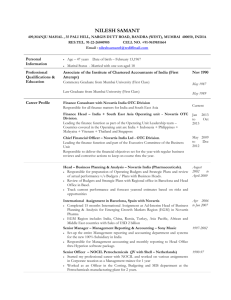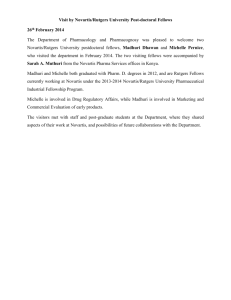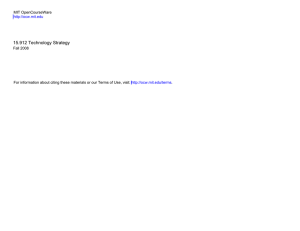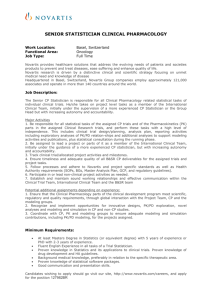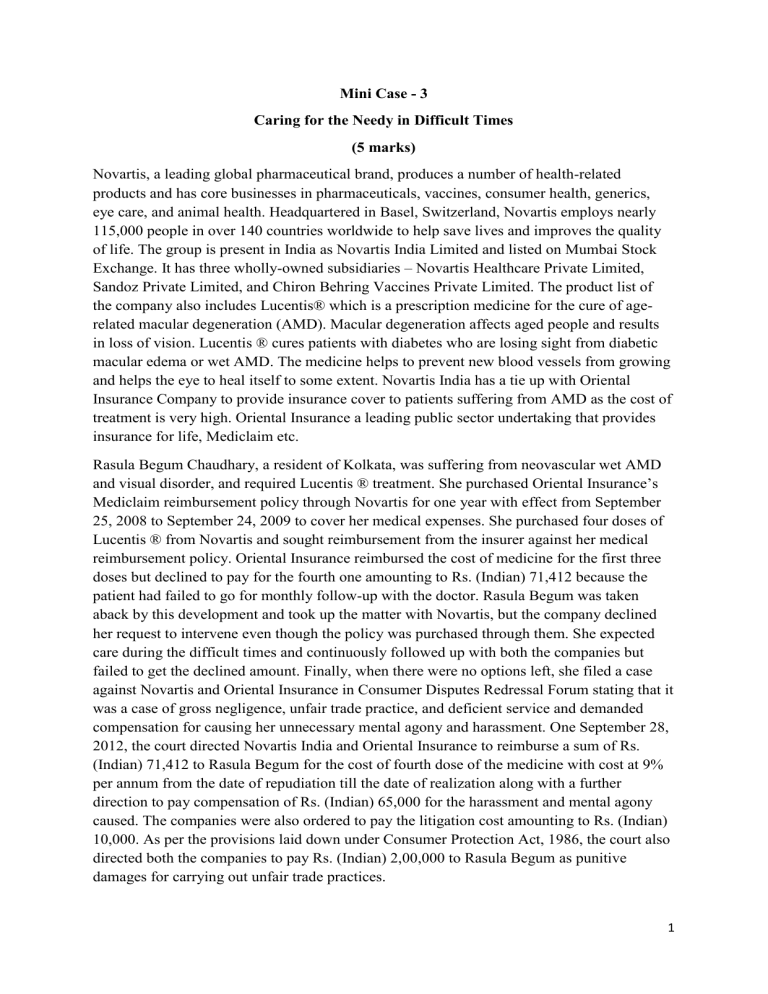
Mini Case - 3 Caring for the Needy in Difficult Times (5 marks) Novartis, a leading global pharmaceutical brand, produces a number of health-related products and has core businesses in pharmaceuticals, vaccines, consumer health, generics, eye care, and animal health. Headquartered in Basel, Switzerland, Novartis employs nearly 115,000 people in over 140 countries worldwide to help save lives and improves the quality of life. The group is present in India as Novartis India Limited and listed on Mumbai Stock Exchange. It has three wholly-owned subsidiaries – Novartis Healthcare Private Limited, Sandoz Private Limited, and Chiron Behring Vaccines Private Limited. The product list of the company also includes Lucentis® which is a prescription medicine for the cure of agerelated macular degeneration (AMD). Macular degeneration affects aged people and results in loss of vision. Lucentis ® cures patients with diabetes who are losing sight from diabetic macular edema or wet AMD. The medicine helps to prevent new blood vessels from growing and helps the eye to heal itself to some extent. Novartis India has a tie up with Oriental Insurance Company to provide insurance cover to patients suffering from AMD as the cost of treatment is very high. Oriental Insurance a leading public sector undertaking that provides insurance for life, Mediclaim etc. Rasula Begum Chaudhary, a resident of Kolkata, was suffering from neovascular wet AMD and visual disorder, and required Lucentis ® treatment. She purchased Oriental Insurance’s Mediclaim reimbursement policy through Novartis for one year with effect from September 25, 2008 to September 24, 2009 to cover her medical expenses. She purchased four doses of Lucentis ® from Novartis and sought reimbursement from the insurer against her medical reimbursement policy. Oriental Insurance reimbursed the cost of medicine for the first three doses but declined to pay for the fourth one amounting to Rs. (Indian) 71,412 because the patient had failed to go for monthly follow-up with the doctor. Rasula Begum was taken aback by this development and took up the matter with Novartis, but the company declined her request to intervene even though the policy was purchased through them. She expected care during the difficult times and continuously followed up with both the companies but failed to get the declined amount. Finally, when there were no options left, she filed a case against Novartis and Oriental Insurance in Consumer Disputes Redressal Forum stating that it was a case of gross negligence, unfair trade practice, and deficient service and demanded compensation for causing her unnecessary mental agony and harassment. One September 28, 2012, the court directed Novartis India and Oriental Insurance to reimburse a sum of Rs. (Indian) 71,412 to Rasula Begum for the cost of fourth dose of the medicine with cost at 9% per annum from the date of repudiation till the date of realization along with a further direction to pay compensation of Rs. (Indian) 65,000 for the harassment and mental agony caused. The companies were also ordered to pay the litigation cost amounting to Rs. (Indian) 10,000. As per the provisions laid down under Consumer Protection Act, 1986, the court also directed both the companies to pay Rs. (Indian) 2,00,000 to Rasula Begum as punitive damages for carrying out unfair trade practices. 1 However, Novartis didn’t agree with this verdict and challenged the order in the upper court. Once again in the court Oriental Insurance maintained its earlier stand for rejecting Rasula Begum’s compensation for the fourth dose. As per the company, she had failed to follow-up with the doctor which was a pre-condition for the release of reimbursement for the fourth dose; hence, the company was not at fault, and there was no deficiency in service on their part. In its defense Novartis, stated that it has no role in claim settlement but admitting having tie-up insurer. After hearing both the parties, on July 2013, the upper court also ruled in favor of Rasula Begum as she managed to produce a valid and relevant doctor’s certificate related to the fourth dose of Lucentis ®. Hence, the insurance company’s plea was rejected and the Consumer Disputes Redressal Forum’s decision was upheld. Questions: 1. What are the ethical issues involved in this case? 2. Why did Rasula Begum meet with problems while settling her Mediclaim? 3. Is it justified, on the part of Oriental Insurance, to deny medical reimbursement to Rasula Begum? 2
